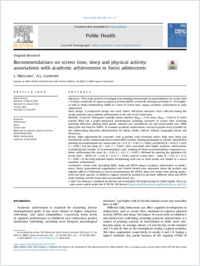Recommendations on screen time, sleep and physical activity : associations with academic achievement in Swiss adolescents
- Marciano, Laura Institute of Public Health (IPH), Università della Svizzera italiana, Switzerland
- Camerini, Anne-Linda Institute of Public Health (IPH), Università della Svizzera italiana, Switzerland
-
2021
Published in:
- Public health. - Elsevier. - 2021, vol. 198, p. 211-217
Adolescence
Sleep
Screen time
Moderate-to-vigorous physical activity
Recommendations
Media multitasking
Academic achievement
English
Objectives: This study aimed to investigate how meeting international recommendations for screen time (<2 h/day), moderate-to-vigorous physical activity (MVPA; at least 60 min/day) and sleep (8e10 h/night), as well as media multitasking (MMI) as a form of screen time, impact academic achievement in early adolescence. Study design: A prospective design was used, where self-report measures were collected during the spring semester and academic achievement at the end of the school year. Methods: A total of 1208 grade 3 middle school students (Mage = 13.55 years, SDage = 0.60) in 37 Swiss schools filled out a paper-and-pencil questionnaire including measures of screen time (covering watching television, playing video games, Internet use, smartphone use and social media use), MMI, sleep time and time for MVPA. To evaluate academic achievement, end-term grades were provided by the collaborating education administration for Italian, Maths, Science, History, Geography, Music and Visual arts. Results: After adjustment for covariates, such as gender, socio-economic status, body mass index and stressful life events, multivariate linear mixed-effect models, nesting participants in schools, showed that meeting recommendations for screen time (B = 0.12, b = 0.105, P < 0.001) and MVPA (B = 0.09, b = 0.09, P = 0.001), but not sleep (B = 0.05, P = 0.087), were associated with higher academic achievement. Considering the number of recommendations met, meeting all three recommendations improved academic achievement the most (B = 0.24, b = 0.21, P < 0.001), followed by meeting the guidelines for screen time þ MVPA (B = 0.20, b = 0.15, P < 0.001) and for screen time þ sleep (B = 0.21, b = 0.13, P < 0.001). In the fully adjusted model, multitasking with two or more media was related to a worse academic achievement. Conclusions: Screen time (including MMI), sleep and MVPA impact academic achievement in adolescence; hence, governmental organisations and schools should raise awareness about the positive and negative effects of following or not recommendations for MVPA, sleep and screen time among adolescents and their parents. In addition, support should be provided to promote sufficient sleep and MVPA while limiting overall screen time and parallel device use.
- Collections
- Language
-
- English
- Classification
- Medicine
- License
- Open access status
- hybrid
- Identifiers
-
- RERO DOC 333710
- DOI 10.1016/j.puhe.2021.07.027
- ARK ark:/12658/srd1319249
- Persistent URL
- https://n2t.net/ark:/12658/srd1319249
Statistics
Document views: 346
File downloads:
- Texte intégral: 688
